
Greetings, all. Ambush Bug here with another special AICN HORROR: ZOMBIES & SHARKS column. This time we catch up with up and coming director, Evan Kelly. Kelly directed THE CORRIDOR a film that has won quite a lot of critical acclaim (I reviewed it here a while back) and can now be seen by the masses in either its limited theatrical release (which began its run last Friday) or more likely on Video on Demand. Here’s what Kelly had to say when I caught up with him last week and talked about THE CORRIDOR!
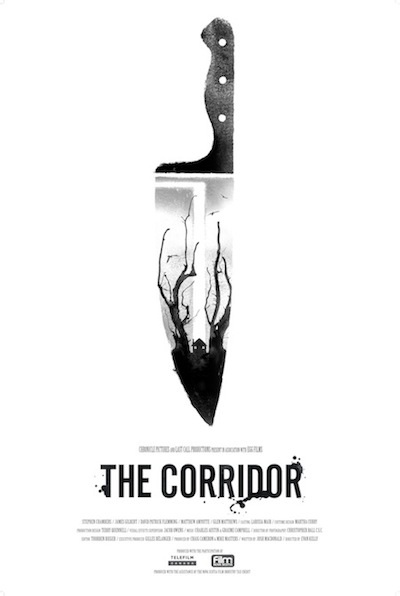 EVAN KELLY: Hi Mark! Thanks very much for taking the time that you have to mention us in your column. We have all really appreciated it.
EVAN KELLY: Hi Mark! Thanks very much for taking the time that you have to mention us in your column. We have all really appreciated it. BUG: Sure. It was a really great film. I caught it last fall at…were you guys at Fantastic Fest?
EK: Yeah, we were at Fantastic Fest. I think we might have sent you a screener as well.
BUG: So what’s that like when you are turning this around? I know a lot of people know about the big budget films and how they get made and everything, but I think everybody’s question for the independent filmmaker is “What’s your story?” How did you get to make this film? How did it all come about?
EK: Sure, well we make our films a little differently in Canada. It’s not quite the American independent model. In this it was a true independent. We were able to kind of work our financing. It’s a blessing and a curse when people talk about Canadian government financing for film. We managed to convince…the government brought in, in this case, the provincial film agency and the national film agency to assist us in making this and we were able to build a financial structure where we didn’t have to presell to a distributor or an exhibitor, which is the case for a lot of films that are down here. So a lot of films here they will give them financing and then kind of sell their souls to the movie channels in order to get made. Once you do, then you’re all of a sudden beholden to somebody else’s demands and requests for choices and changes even though they haven’t bought into your film that heavily.
BUG: Sure.
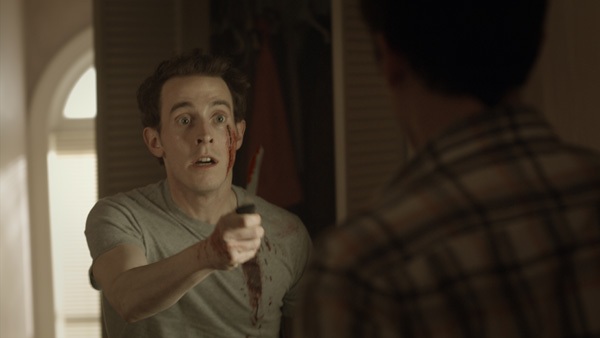 EK: To the credit of our producers, we managed to scrabble together enough money to make this film without any sort of obligation, which was exciting and terrifying, because when you come through at the other end you may have something that nobody wants. You don’t have anybody telling you what to do, but you’re going to wear your successes and failures completely.
EK: To the credit of our producers, we managed to scrabble together enough money to make this film without any sort of obligation, which was exciting and terrifying, because when you come through at the other end you may have something that nobody wants. You don’t have anybody telling you what to do, but you’re going to wear your successes and failures completely. BUG: I was just wondering, since this isn’t like a vampire movie or a zombie movie, was it hard to convince people to take a look at it or give it a chance?
EK: I think it’s always going to be hard to get people to give it a chance, because it doesn’t have that prepackaged understanding or there’s not a face on the film that everybody recognizes and knows and loves, so I think what we found in the festival process is this growing modest word of mouth and it’s the word of mouth where, you know, some partners now like IFC Films and their Canadian distributor just kind of bought into it. They have an understanding that when it finds its audience, I think it really kind of…for us even getting people involved in it is just the strength of the story, so the same thing that kind of happens to the viewer and it happened in the creation process where if you gave it enough time to sit down and open yourself to it, it generally kind of wins you over.
BUG: So I didn’t want to reveal too much of the film, but what is your elevator pitch for the film? What’s the quick synopsis you can give to people who aren’t familiar with the movie?
EK: It’s a hard one, right? It’s a hard one to kind of package down. I think it’s a modest reinvention of the cabin in the woods story. It’s a character drama that unfolds into a thriller and then to a horror and then ultimately to a scifi mindfuck. That’s about as short as it kind of can be, but it’s all pretty much grounded in horror, so it’s five guys who find something in the woods and find something about themselves.
BUG: Yeah, and that’s the thing that really stood out about the film to me. It felt like…I’m in my late 30’s and I could totally see all of my buddies and myself going out where we are still trying to relive those high school years, but somehow real life sort of seeps in and really destroys that. Are you that age? Is that kind of what your experience was like?
 EK: We are all that age, all of us who were involved. I’m 38 and we are all within two or three years of each other and everybody has those sort of crises that these guys are facing and maybe they are a little bit younger than us and some of us have managed greater or lesser success that the characters, but we can all identify with them. That was the fun part of the film process, that everybody involved can come in and see the reflection of those five guys among their own peer group. It doesn’t line up necessarily perfectly, but it all kind of rings true. There’s that anxiety of “When is life exactly supposed to begin in terms of meeting your future?” It portrays it in a different way than maybe the conventional movie treatment of, kind of like, arrested development…it’s definitely something that attracted me to it. It’s something I totally understand. I’ve made ten short films and I’ve certainly lain awake at night trying to figure out my own mess and having thoughts of my own future.
EK: We are all that age, all of us who were involved. I’m 38 and we are all within two or three years of each other and everybody has those sort of crises that these guys are facing and maybe they are a little bit younger than us and some of us have managed greater or lesser success that the characters, but we can all identify with them. That was the fun part of the film process, that everybody involved can come in and see the reflection of those five guys among their own peer group. It doesn’t line up necessarily perfectly, but it all kind of rings true. There’s that anxiety of “When is life exactly supposed to begin in terms of meeting your future?” It portrays it in a different way than maybe the conventional movie treatment of, kind of like, arrested development…it’s definitely something that attracted me to it. It’s something I totally understand. I’ve made ten short films and I’ve certainly lain awake at night trying to figure out my own mess and having thoughts of my own future. BUG: Sure. It does seem like that’s the trend in films these days and less so this is more of like a horror version of a lot of the other films that you see, like a lot of the comedies seem to have these men in arrested development, as you said, and also it reminded me of FIGHT CLUB in a couple of the conversations that they had about how men are now kind of like grown children. Is that something you were trying to get across here?
EK: I think it’s true, because I think the things that are probably sticking out for all of us are things that we identify in ourselves and in the culture. Not like we will be part of the conversation, but I look to when the historians look back a couple of decades from now and go “You know what typifies the social anxiety of the time? These are people who couldn’t move forward. They didn’t know how to express themselves”, and like you say it’s about expressing yourself in FIGHT CLUB and these movies. Maybe they will notice somewhere in the corner there is this little thriller horror film that explored that as well. For us, there’s a lot of touch points in film that provided some information to us whether it be genre classics, and we are not trying to compare ourselves to these, but something like THE THING or simply a cabin in the woods like EVIL DEAD, but for me as well there are movies like OLD JOY. Have you seen that?
BUG: No, I haven’t seen that.
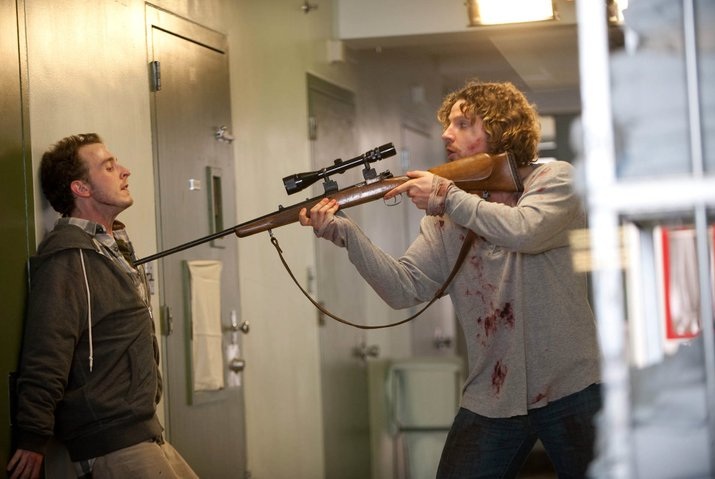 EK: It’s a Kelly Reichardt movie. She directed WENDY & LUCY and MEEK’S CUTOFF. Anyways, this is a film about two friends in a similar situation where they don’t really know where they should be and they don’t even know how their relationship should still work and they go for a walk in the woods. It’s a real kind of critical darling indie film, and the whole time the tension of that film for me…I didn’t know what the hell was going to happen to these guys. Anything was plausible. One guy was going to either surprise his friend by kissing him or killing him. I didn’t know what was going to take place and I wont spoil it the movie any further, but it doesn’t take the turn that ours does, but in some way they there is an affinity, maybe it’s that cultural affinity between our film and that kind of shared social anxiety, but ours just has a kind of cathartic resolve to it all.
EK: It’s a Kelly Reichardt movie. She directed WENDY & LUCY and MEEK’S CUTOFF. Anyways, this is a film about two friends in a similar situation where they don’t really know where they should be and they don’t even know how their relationship should still work and they go for a walk in the woods. It’s a real kind of critical darling indie film, and the whole time the tension of that film for me…I didn’t know what the hell was going to happen to these guys. Anything was plausible. One guy was going to either surprise his friend by kissing him or killing him. I didn’t know what was going to take place and I wont spoil it the movie any further, but it doesn’t take the turn that ours does, but in some way they there is an affinity, maybe it’s that cultural affinity between our film and that kind of shared social anxiety, but ours just has a kind of cathartic resolve to it all. BUG: Yeah, and I also wanted to touch on the scifi aspects that you mention. What’s the main question that people come to you with after seeing the film? You do keep it kind of ambiguous towards the end and I don’t want to give away too much, but what’s the main question that you are kind of faced with when you are able to talk to people who have seen the film?
EK: I’ve got two quick answers. There are two main questions. One half of the audience, or not even half, one fourth of the audience will just look at us and say, “What the fuck happened?” I think that kind of audience wants a little bit more explanation, but a whole other big portion of the audience will come to us with questions of “Hey, was this what happened?” They will offer up some avenue of interpretation and that part of the audience we are always able to say, “Yes, it could be. It totally could be.” When we were first discussing the film before we even shot it, amongst the actors, all of the things that were kind of speculated and offered up in those early discussions have revisited us by the festival audiences. People have said “Is it about this?” Whatever the phenomenon, how people want to interpret the phenomenon, they are able to invest their own understanding in it, so some times it is people who are wanting to engage with it and complete connections on their own where there is space for them to do so. They also want confirmation that they have interpreted it correctly, which there is a multitude of interpretations.
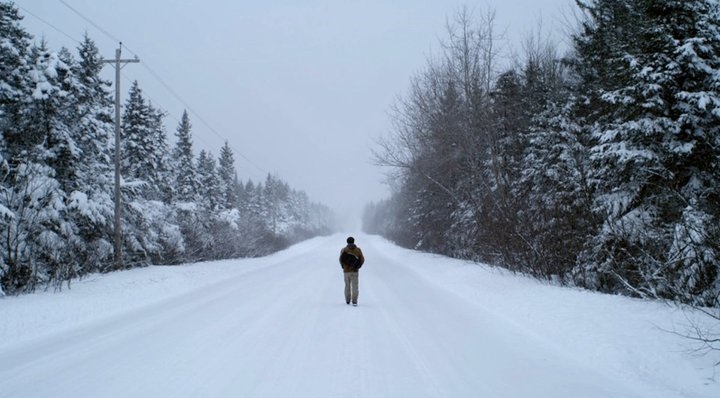 BUG: Yeah, and I’m glad…is that a feeling of accomplishment that the same questions you were asking, the audience is asking later on? It kind of makes it sound like your message actually did come across.
BUG: Yeah, and I’m glad…is that a feeling of accomplishment that the same questions you were asking, the audience is asking later on? It kind of makes it sound like your message actually did come across. EK: It’s like making a film without a distributor is a big risk, but that is the sense of payoff, that the things that intrigued you or excited us through the process that other people are finding them when it’s all said and done is extraordinarily gratifying and I think that that portion of the audience really gets their itch scratched. Not to compare it, but something like PRIMER…PRIMER sits high on my shelf of favorite movie experiences. Although some people say they can explain it, I have no understanding of what exactly it means, but I’ve got my own concept of what it could mean and I’m extraordinarily satisfied by something like that. So that sort of button that gets pushed, something we were hoping to push, and it’s relieving and gratifying that people are connecting with it that way.
BUG: Yeah, and I’m glad you didn’t over explain it. Was there ever any pressure to do that from distributors or anything like that?
EK: No. We were given a lot of space, and so the distributors came later and we are so happy that they came on board, but in the creation of it we were given a lot of space to do what we hoped to do and there were moments of doubt amongst ourselves, so in the film we were like “Is this going to be too ambiguous? Is this going to be too open?” But we kind of stuck to our guns and I think if we didn’t hit the bull’s eye, then we’re pretty close on target.
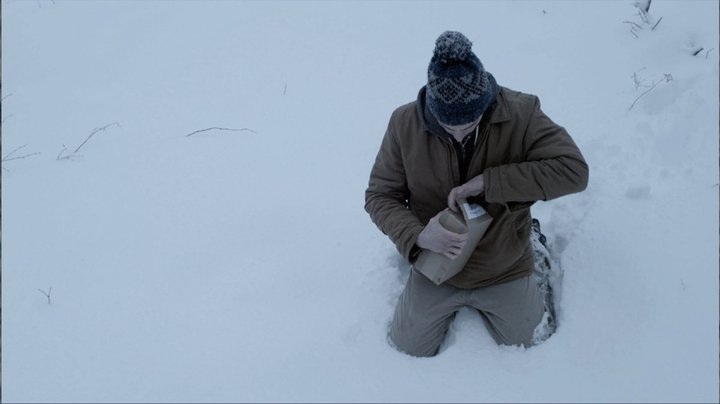 BUG: The film gets pretty gory towards the middle of it. Was their any reaction to that? How did the actors feel about going into this really dense character drama and then all of a sudden it takes a turn towards the gory? Was there any kind of people who were a little queasy for that or hesitant to do that?
BUG: The film gets pretty gory towards the middle of it. Was their any reaction to that? How did the actors feel about going into this really dense character drama and then all of a sudden it takes a turn towards the gory? Was there any kind of people who were a little queasy for that or hesitant to do that? EK: Oh come on, you know when you are shooting there’s just play time, so everybody is pretty excited about it save for the moments when the blood gets in your eyes and the sugar that might be in the blood syrup starts to burn. Beyond that everybody is being engaged with the possibility of just kind of like paying off those character moments in grand guignol fashion. Instead of having two people who you watch bubbling with resentment…to actually see the moment when it boils over, almost absurdly boils over, was something that was exciting for all of the actors, and really anybody who kind of gave the story a chance.
BUG: I especially like the…it’s almost like the scalping scene where the guy gets scalped and everything. It’s such a visceral kind of feel to it and it was done really well. It was handled almost in kind of a Tarantino fashion where you see what’s gong on, but also it’s kind of suggested.
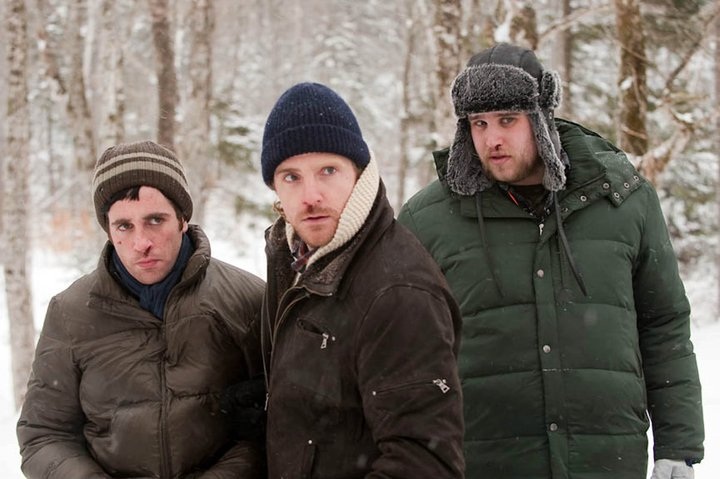 EK: And the most important part of like each of those moments is that they have their origins of what happens to each of the guys is kind of predicted or interpreted. Almost all of these acts of violence are done from a very loving place amongst these guys. These are just absurd solutions to each of their problems, so the approach to creating it for all of us was just “This is where the characters under these circumstances wanted to go.”
EK: And the most important part of like each of those moments is that they have their origins of what happens to each of the guys is kind of predicted or interpreted. Almost all of these acts of violence are done from a very loving place amongst these guys. These are just absurd solutions to each of their problems, so the approach to creating it for all of us was just “This is where the characters under these circumstances wanted to go.” BUG: Tell me a little bit about filming in the snow. I know that that kind of opens up its own set of problems, and you mentioned THE THING, and it does remind me of THE THING, and I don’t know if it’s just because of the environment you filmed it in, it’s a snowy cabin in the woods kind of story and you don’t see much of those, so THE THING always kind of comes to mind. Was it hazardous for you guys? It seemed kind of pleasant, but it definitely looked cold.
EK: The cold wasn’t the problem. You can bundle yourself against the cold and so for the most part the cold wasn’t an issue. For us, where we live which is in Halifax, Nova Scotia, Canada, it’s a pretty safe bet to know that you’re going to have snow in the winter, but absurdly that year during filming the snow just started to disappear and it went away. The logistical challenge was shooting it in snow and I’ll walk into another project with my eyes wide open, but you can’t beat the atmosphere. You don’t see it frequently enough. There’s a real mood. There’s a real atmosphere. There’s a sense of both isolation and decay in the winter, so there are qualities to shooting this film that are worth suffering all of the challenges in actually doing it.
BUG: I just wanted to congratulate you on a great film. What’s next for you? What’s coming up next after this long stint of festival touring and everything else?
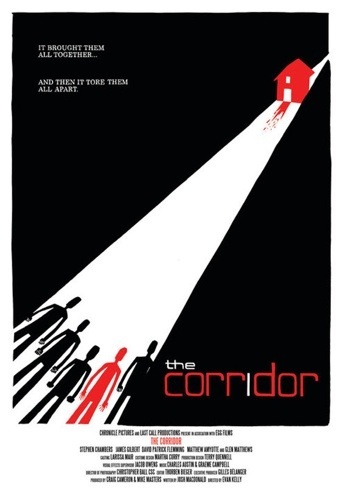 EK: The unsatisfying answer is that anything that we are trying to get going is just in its early infancy, so we are actively looking for opportunities for the next project. The making and presenting of this film has been so time consuming that there’s not something keyed up and ready to go, but it was such a great experience for us both in the creation of it and in the taking of it around that we are hoping to get something going soon that all of us collectively can follow this up. We’ve got a great momentum and we are trying to capitalize on it. So there’s nothing yet, but Mark, I’m always looking.
EK: The unsatisfying answer is that anything that we are trying to get going is just in its early infancy, so we are actively looking for opportunities for the next project. The making and presenting of this film has been so time consuming that there’s not something keyed up and ready to go, but it was such a great experience for us both in the creation of it and in the taking of it around that we are hoping to get something going soon that all of us collectively can follow this up. We’ve got a great momentum and we are trying to capitalize on it. So there’s nothing yet, but Mark, I’m always looking. BUG: Great. Fantastic. Well, best of luck to you. The film opens in limited theaters this week, correct?
EK: Really the avenue that most people will be able to access it through is through a variety of VOD services.
BUG: Sure. Okay, well, thanks a lot for your time. I really appreciate it. It’s a great film and congratulations on all of your success with it.
Be sure to seek out THE CORRIDOR (find out more about it here), currently in limited theatrical release and soon to be released on VOD everywhere!
See ya Friday, folks!
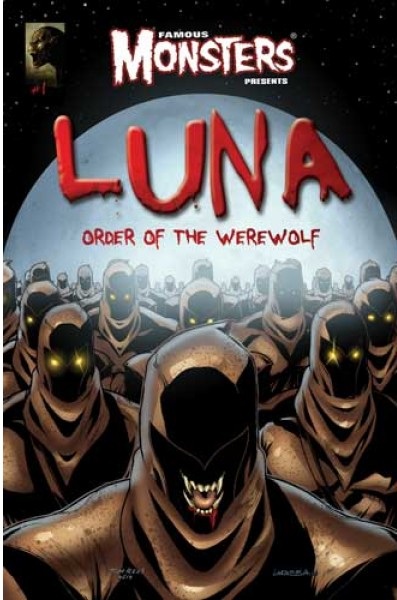
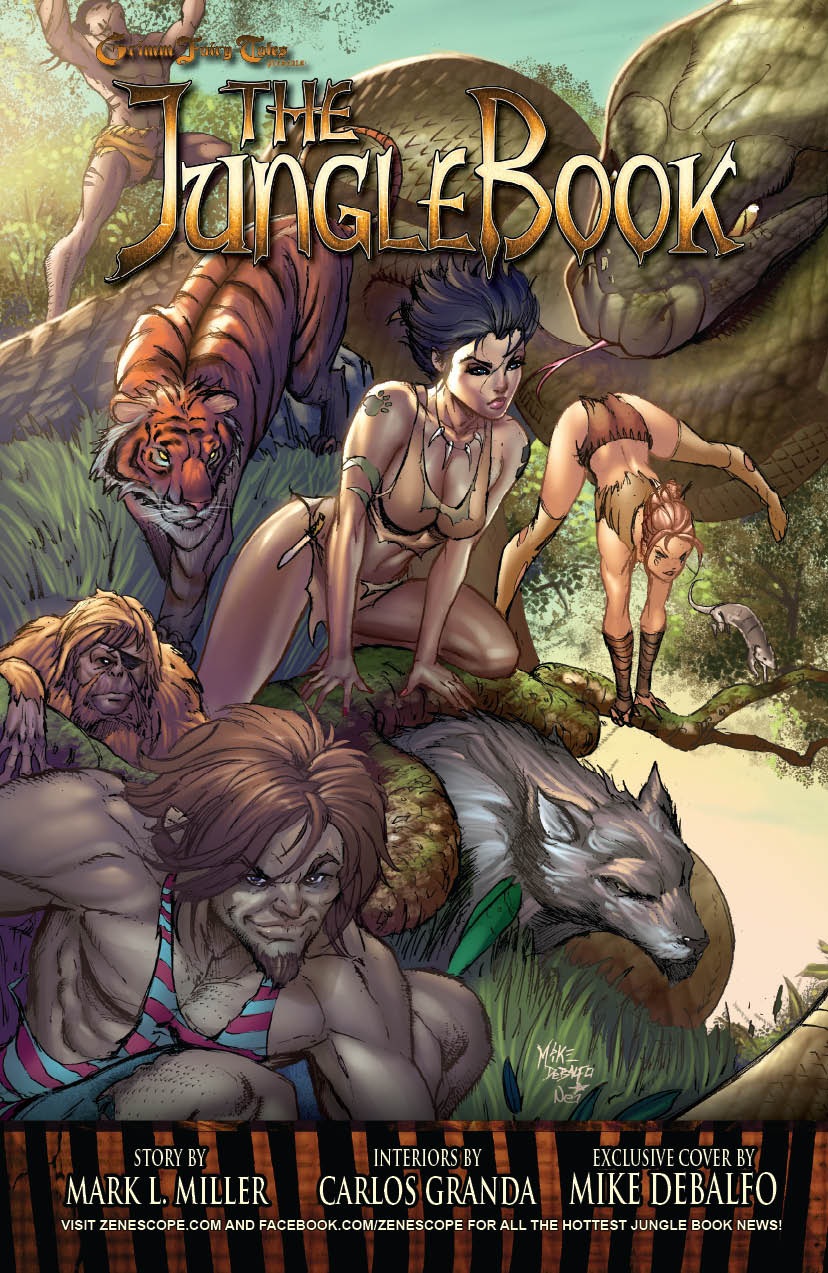 Ambush Bug is Mark L. Miller, original @$$Hole/wordslinger/reviewer/co-editor of AICN Comics for over ten years. He has written comics such as MUSCLES & FIGHTS, MUSCLES & FRIGHTS, VINCENT PRICE PRESENTS TINGLERS & WITCHFINDER GENERAL, THE DEATHSPORT GAMES, WONDERLAND ANNUAL 2010 & NANNY & HANK (soon to be made into a feature film from Uptown 6 Films). He is also a regular writer for FAMOUS MONSTERS OF FILMLAND & has co-written their first ever comic book LUNA: ORDER OF THE WEREWOLF (to be released in October 2012 as an 100-pg original graphic novel). Mark has just announced his new comic book miniseries GRIMM FAIRY TALES PRESENTS THE JUNGLE BOOK from Zenescope Entertainment to be released in March 2012.
Ambush Bug is Mark L. Miller, original @$$Hole/wordslinger/reviewer/co-editor of AICN Comics for over ten years. He has written comics such as MUSCLES & FIGHTS, MUSCLES & FRIGHTS, VINCENT PRICE PRESENTS TINGLERS & WITCHFINDER GENERAL, THE DEATHSPORT GAMES, WONDERLAND ANNUAL 2010 & NANNY & HANK (soon to be made into a feature film from Uptown 6 Films). He is also a regular writer for FAMOUS MONSTERS OF FILMLAND & has co-written their first ever comic book LUNA: ORDER OF THE WEREWOLF (to be released in October 2012 as an 100-pg original graphic novel). Mark has just announced his new comic book miniseries GRIMM FAIRY TALES PRESENTS THE JUNGLE BOOK from Zenescope Entertainment to be released in March 2012.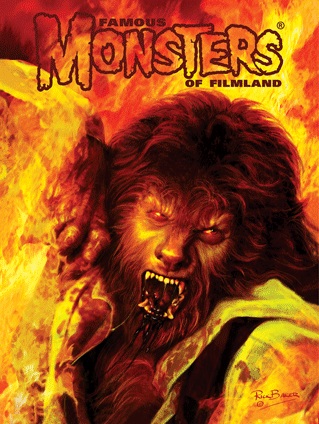
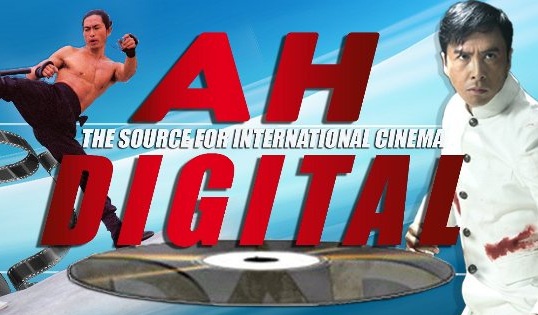

Check out AH Digital: the source for international cinema!
Interested in illustrated films, fringe cinema, and other oddities?
Check out Halo-8 and challenge everything!
Find more AICN HORROR including an archive of previous columns
on AICN HORROR’s Facebook page!
